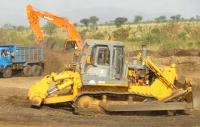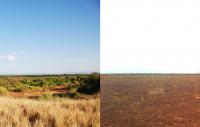Survival has uncovered shocking new evidence of human rights abuses against tribes in Ethiopia’s Omo Valley, as government efforts to develop lucrative sugar cane plantations in the region intensify.
Bulldozers are flattening land near a UNESCO World Heritage Site, destroying villages and forcing local communities to give up their pastoral way of life. Fear is growing as violence becomes commonplace and reports of beatings, rapes and arrests spread among tribes close to the Omo River.
As recently as January 2012, Survival received reports of three Bodi men being beaten to death in an Ethiopian jail.
The government is also ordering families to sell their livestock. One man told Survival, ‘My money is my cattle. My bank account is my cattle.’
Survival has exclusive photographs of a road Ethiopia’s government is building, which cuts straight through tribal land, to improve access to land clearance sites.

One Mursi man said, ‘The government is building sugar cane plantations on my land. When you see it you will cry – there are no bushes in the Omo Valley now.’ Two UN bodies have already asked Ethiopia to provide evidence that tribes are being consulted, and that current developments are not damaging the area’s cultural and natural heritage. However, Ethiopia has ignored such calls. Survival has also received disturbing reports that Ethiopia has begun the process of forcibly resettling tribes in the Omo Valley, a tactic known as ‘villagization’. Communities have been given one year to relocate, in a programme similar to that reported by Human Rights Watch in Ethiopia’s western Gambella region. One Mursi man told Survival, ‘It (the government) came, took our land and told us it wants to move all the people in the Omo valley to stay in one place like a camp.’
Survival International said today, ‘The Ethiopian government is responsible for some of the most flagrant and violent human rights abuses that Survival has seen in years. By dressing up the theft of tribal land as ’development’, it expects to get away with such atrocities. State and private investors will be the only ones to benefit from the Omo Valley sell-off, while self-sufficient tribes face destruction


